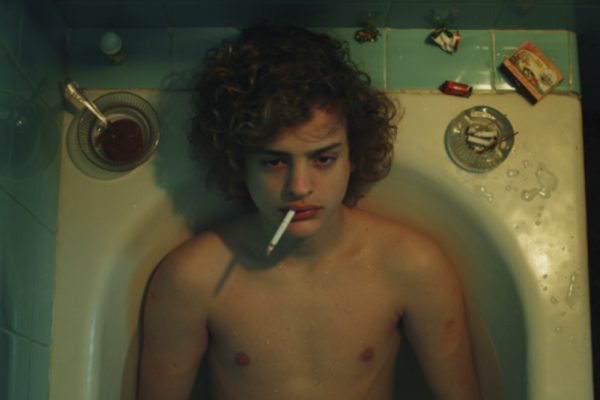It’s a hot commodity – murder. Admit it, we’ve always found fascination in the minds of those who kill. Otherwise, Netflix wouldn’t have half the popularity or library as it has now. Taking inspiration from ‘The Angel of Death’ Robledo Puch, Luis Ortega’s true(ish) crime drama El Angel reimagines the youth’s life, as he turns to a path of murder and theft, all while maintaining a polite demeanour, childlike innocence and kindred connection with fellow thief Ramón.
Crafting an androgynous beauty, a poisonous charm with an alluring nature, Lorenzo Ferro liberates killer Carlos Puch, moving from the otherwise true-crime aspect of the film. Breaking from the attractive killer, there’s a coldness with Ferro’s portrayal which captures intrigue. An innately physical performance, his hollowness adds to the chill, casually dancing around crimson-stained floors, his empty-faced saunters a reminder of the detachment from emotion or reason. Even, when it comes to his decisions over the closest he comes, to genuine connection, with Ramón.
Chino Darin’s Ramón cuts a different style to Carlos. Young, impressionable, seeking the pleasures in life, while Carlo’s motivation is more complex, Ramón seeks fame. Fame, adoration, cash, and while refusing to admit, Carlos himself. Darin is cocky, arrogant but god-damned charismatic in his portrayal, we pity his squalled attempts at pursuing a music career, his descent from a part-time thief into a full-blown criminal. It’s a calm performance, refraining from overstating a character whose sexual frustrations, especially concerning Carlos, are tensely tangible.
The addition of a simmering relationship between Carlos and Ramón is a dangerous narrative choice in substituting the truth. Carrying their performances so well, however, it blossoms as the correct direction for the film’s interpretation. An admiration, a friendship, and a complex physical attraction, despite Ramón’s homophobic protestations, are understated, never leaning into cheap, tacky character exploitation.
In what may be a curious explanation of humour, El Angel’s brilliance lies in how little it draws attention to its jokes or moments of levity. It’s an awkward humour, which heightens the gags intensely. When a visual joke, such as the entire precinct waiting for a mother to finish a phone call, all casually glaring at her with rifles pointed, it’s directly from a David Zucker Screwball comedy.
Thoroughly playful, the score decides to get in on the action to convey a sense of childlike toying. Light, bouncing and at times, even inappropriate, the music is the one acceptable use of this whimsical direction. Blemishing an otherwise brilliant film though is that this playground touch on side characters, particularly Juan Pedro Lanzani’s Miguel, who turns in a decent performance, lacks any of the savageries we have seen thus far.
The world belongs to the artists and the outlaws. Or at least, it does in Ortega’s mind. It’s a fine line, there is an arguable arrangement in the film where criminal activity is artistry, or at the very least how the film frames itself certainly is. El Angel may find itself in a genre of true-crime, but its aloof attitude to theft, murder and relationships sets it apart from others. With an exceptional lead performance, it’s a contender for fans of true-crime looking for fresh blood.
